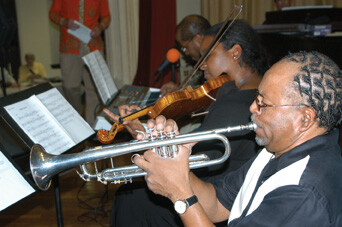
D.C. church steps 'into the reign of God now'
BY MELISSA LAUBER
UMCONNECTION Staff
To celebrate its 180th anniversary, Wesley UMC in Washington, D.C., is "stepping into the reign of God now," with a jazz band, salsa dancing, Afro-Columbian food, children playing in colorful crowns and a Gospel message of extravagant welcome.
 Almost two centuries ago, the people of this affluent suburb came together to create a faith community. Over the years, their faithfulness has bloomed at different moments in a variety of ways, said the Rev. Whit Hutchison. Today, the church is trying to be faithful by creating a multi-cultural community in which everyone feels equal and able to participate with joy.
Almost two centuries ago, the people of this affluent suburb came together to create a faith community. Over the years, their faithfulness has bloomed at different moments in a variety of ways, said the Rev. Whit Hutchison. Today, the church is trying to be faithful by creating a multi-cultural community in which everyone feels equal and able to participate with joy.
"Community can be a hard thing to create, " Hutchison said. "But we need to be intentional and do so. Multicultural community is what the world needs from us."
To do this, Hutchison said, "the church must create circumstances for people to encounter the large-heartedness of Jesus.
"United Methodists tend to be individualist," Hutchison said. "But what the Gospel asks of us, we can't do alone. We need to walk with one another to figure out how to respond. To do justice and love kindness is more than I'm capable of by myself. Together we create a robust faith, a faith that will be bold."
Part of the boldness of the 130-member congregation at Wesley UMC is being willing to open its door, at no costs, to diverse community groups.
The Manuel Zapata Olivella Center is one such ministry, which revolves around the needs of the under-served Afro-Hispanic community. The center, supported by a grant from the Baltimore-Washington Conference, is under the direction of Umberto Garcés.
Among the services it offers are English and Spanish language classes, immigration counseling, career development, literacy programs, worship in Spanish and cultural events designed to raise awareness of wider community concerns such as poverty and human rights.
Latinos of African ancestry are often discriminated against. In Latin America and the Caribbean, conditions "often get worse the darker your skin is," Garcés said.
Afro-Dominicans, Afro-Peruvians, Afro-Columbians, all of which have large communities in D.C., have their own unique food, music, art, history and world view. They are distinct cultural groups, but they are also often viewed as "other." In health care, employment and other opportunities, discrimination affects people in negative ways, said Garcés.
The Manuel Zapata Olivella Center attempts to change that. "We started with four women in English classes," Garcés said. "We're up to 40. Those women do not want to miss class. This makes me so happy."
Garcés, who came to the United States in 2001, said he came from a poor family. He remembers getting up at 3 a.m. to work before school. It was not an easy life. "I would look to heaven and ask, ‘God, why are you doing this,'" he said.
When he immigrated, people in the United States opened their doors to him and his family. "So, now we help others. We try. Why not?" he said. "It fulfils me as a human being."
Garcés believes that God opens doors, which is a prominent theme in the community at Wesley.
Rather than starting a second congregation for the Hispanics, the congregation has chosen to diversify its offerings, becoming a place where cultures can happily collide.
For example, some Hispanic people have a more relaxed version of start times. To accommodate this point of view and the people who want to begin promptly on time, worship now includes fellowship time at tables set up in the sanctuary as services begin.
Once a month, they have lunch after the 11 a.m. service and hold a Spanish-language service at
1:30 p.m.
The congregation believes "everything in church should stem from the abundance of God," Hutchison said. "Love is the center of community, not fear."
By and large, radical hospitality steers the church's agenda. "Practice and action change the nature of the relationship between people," Hutchison said. "It begins with servanthood, which can bring down the walls of difference. People know you're for real. They know you're authentic."
This bold kind of outreach, that meets people at their point of need, may be the future of the 180-year-old church. "In truth, the church gathered is not the principle context. We are not who we are on Sunday morning," Hutchison said. "Church is the dress rehearsal, the locker room. Life is the real game. At church we gain some clarity for the practice of life."

Login/Register to leave comment